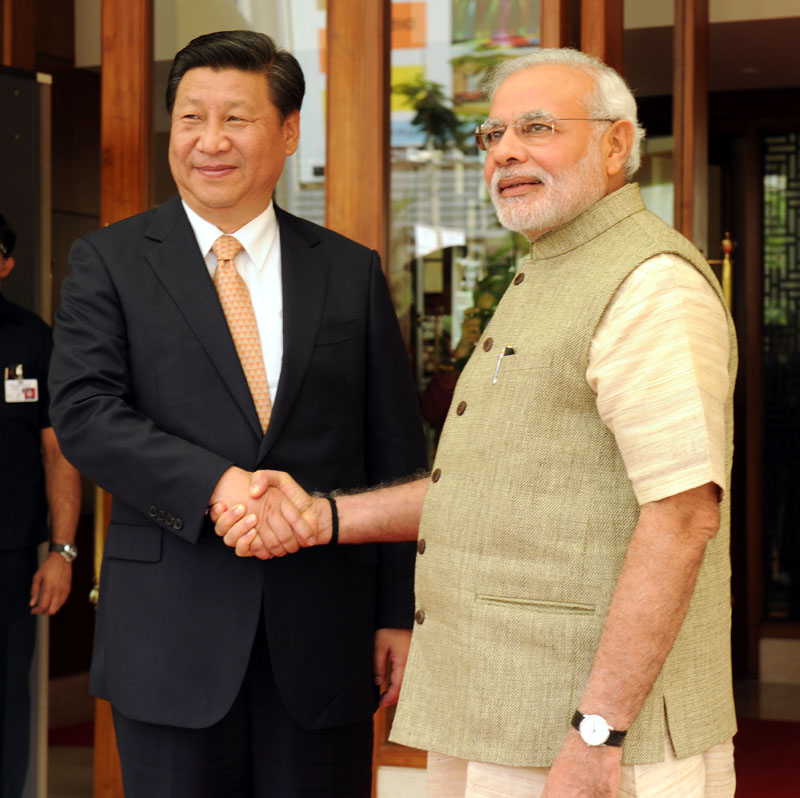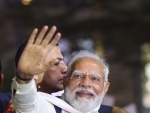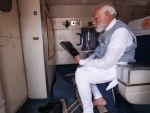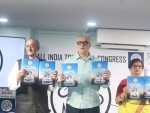April 26, 2024 12:48 (IST)

Amid border stand-off, India-China signs 3 MoU's
Ahmedabad, Sept 17 (IBNS): Amid border dispute, India and China inked 3 pacts during Chinese President Xi Jinping's first day of his three-day India visit which started from Ahmedabad on Wednesday.
According to reports, India and China ink "sister-city pact" between Guangzhou and Ahmedabad for cultural exchange.
Apart from that one of the MoUs, to be inked between China Development Bank (CDB) and Industrial Extension Bureau (iNDEXTb) of Gujarat government, relates to development of industrial parks in the state.
Another pact will be signed between China's Guangdong province and Gujarat government.
All pacts are made in presence of Chinese President Xi Jinping and Prime Minister Narendra Modi.
Chinese president Xi Jinping’s visit comes in the middle of a new face-off at the contested border between India and China at the Line of Actual Control.
Media reported on Monday that recently Chinese People's Liberation Army (PLA) tried to intrude into the Ladakh region.
The reports said, a mixed patrol of Indian Army and Indo-Tibetan Border Police (ITBP) troops saw more than 200 Chinese People's Liberation Army (PLA) troops with 12 heavy vehicles including cranes, bulldozers and a Hummer tried to level a rivulet and construct a temporary road two kilometres into Indian territory in the Chumur sector.
Meanwhile, BJP MP from Ladakh Thupstan Chewang has said that the Chinese army is threatening people living along the Indo-China border, and is encroaching into the Indian territory.
He alleged that the Chinese troops are "building permanent structures" on the Indian side of the Line of Actual Control.
All these lead to stand-off between 2 nuclear-powered nations.
To resolve the issue, a Flag-meeting was called on Tuesday by the commanders of the respective armies.
India took a strong stand at a flag meeting initiated by China and said it would firmly defend its 3,500-km border with the country.
But the meeting ended without producing any results, which prompted them to call another Flag-meeting on Wednesday evening.
But, despite the stand-off the diplomacy looks to head steady with Xi Jinping being given a grand welcome by PM.
Modi, who celebrated his 64th birthday on Wednesday, was in Ahmedabad to welcome Xi.
This is the first visit to India by a Chinese president since 2006. When Chinese premier landed, a traditional Gujarati dance greeted President Xi and his wife Peng Liyuan at the airport.
PM Modi later received the couple at a hotel with flowers.
In a rare gesture, PM Modi and President Xi will share a moonlight dinner on Wednesday night in a Swiss luxury tent on the banks of the river Sabarmati.
Xi will be treated to a 150-dish Gujarati banquet which will include Khaman and Dhokla.
They are also expected to walk down the riverfront.
Ahead of the dinner, Chinese President visited the Sabarmati Ashram in Ahmedabad and paid respects to Mahatma Gandhi in the evening.
According to sources, Jinping will fly to New Delhi on Wednesday night.
On Thursday, the two premiers will hold formal bilateral talks.
It has been learnt that the main agenda of the talks will be trade & commerce.
But, the decades-old border conflict is expected to figure in talks, as well as the visa-issue.
Apart from that Beijing’s objection with respect to state-owned ONGC Videsh (OVL) to explore oil and gas in offshore South China Sea along with Vietnam’s state owned PetroVietnam might also figure in talks.
But experts feel, border dispute can be a bone of contention between two countries.
Though Modi has sought to negate the tensions building between the two neighbouring countries on Tuesday by saying that said the relationship between the two countries "goes beyond plain arithmetic", and summed up ties with a new mantra - "Inch (India and China) towards Miles (Millennium of Exceptional Energy)."
Speaking to Chinese media, ahead of Xi's visit, Modi said with the aid of India's neighbour China, history can be re-scripted. Modi said: "I think that the special and unique nature of India-China relations rests in the fact that India and China are bound by history and connected by culture. India and China both have rich traditions."
Speaking on how India and China can work together in promoting peace and development, Modi said the same can be done by "strengthening our strategic communication; enhancing mutual trust and confidence; showing sensitivity to each other's concerns and interests; continuing to maintain a climate of peace, stability and tranquillity in our relations; and, seizing the opportunities for bilateral cooperation and international partnership."
"There is a history of deep ties between our people and between our countries. The arithmetic and chemistry of our relations convinced me that together we can script history and create a better tomorrow for all of mankind," said the PM.
He said, "India and China today constitute almost 35% of the world’s population. From a purely arithmetic point of view, the betterment of 35% of the world’s population and eradication of poverty; that they decide to work together will open big gates for progress and development in the world. It will not take long for the rest 65% to rise as well."
Modi said that it is India and China, who were responsible for the largest GDP contribution in the world some 300 years back.
"If you go back 300 years into history, the largest GDP contribution in the world used to come from India and China, who together contributed more than half of the world’s GDP. Not only from the perspective of arithmetic, have India and China do possess common chemistry. Whenever India and China have worked and grown together, this has also led to the development and economic prosperity of the world," said the PM.
He said sugar is called 'Cheeni' in Hindi owing to the fact that Chinese technology is used to refine the same.
"You would have heard that in India, we call sugar in Hindi as ‘cheeni’. It is not known as ‘cheeni’ for nothing. It is because of the Chinese technology that we were able to refine the sugar and make it pure and hence the people of India, started calling sugar as ‘cheeni’," he said.
"We seek a closer developmental partnership. India can benefit from China’s strength in hardware such as creation of infrastructure and development of our manufacturing sector. These are the areas where India wants to make rapid progress. On the other hand, India’s strength in software can help Chinese companies to become more efficient and competitive. It offers opportunity for Indian companies to export services to China. With joint efforts, we can strengthen our economic partnership," Modi said.
"China is our largest neighbour. Relations between neighbours are always of special importance to each country, because their destinies are inter-linked. That is why I have also placed special emphasis on India's neighbourhood. But, I don't see our relations with China only as a neighbour, with which we have had millennia old contacts. China is important for the future of this region and the world," he said.
Support Our Journalism
We cannot do without you.. your contribution supports unbiased journalism
IBNS is not driven by any ism- not wokeism, not racism, not skewed secularism, not hyper right-wing or left liberal ideals, nor by any hardline religious beliefs or hyper nationalism. We want to serve you good old objective news, as they are. We do not judge or preach. We let people decide for themselves. We only try to present factual and well-sourced news.
Support objective journalism for a small contribution.
Latest Headlines
WhatsApp warns to shut down services in India if asked to break encryption of messages Fri, Apr 26 2024
Supreme Court rejects pleas seeking 100 percent verification of votes on EVM with VVPAT slips Fri, Apr 26 2024
Voting in second phase of Lok Sabha polls underway Fri, Apr 26 2024
Plea filed in Calcutta HC seeking action against Mamata Banerjee's 'judges purchased' remark Fri, Apr 26 2024
'Most compassionate and kind': Musician Ricky Kej on Ratan Tata after conferring humanitarian award Thu, Apr 25 2024
Bollywood actor Neha Sharma campaigns for her father in Bihar amid rumours of poll debut Thu, Apr 25 2024







